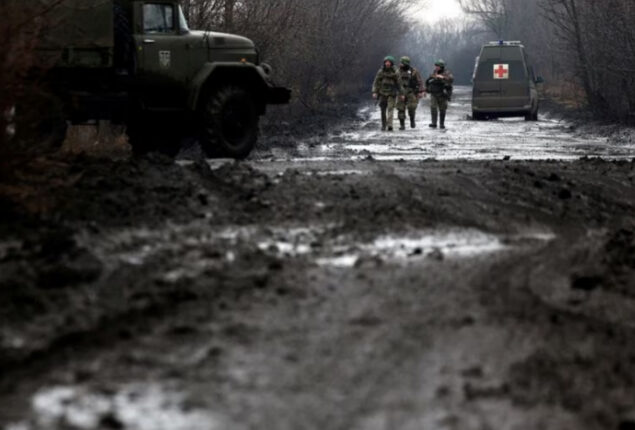Victory in Bakhmut lead to further advances, says Sergei Shoigu
Taking Bakhmut will enable Russian soldiers to march farther into Ukraine, said...

Ukraine says Bakhmut battle wearing down Russia’s best units
Ukraine has decided to fight on in the devastated city of Bakhmut because the war is trapping down and degrading Russia’s best battalions ahead of a planned Ukrainian spring counter-offensive, according to an assistant to President Volodymyr Zelenskyy.
Mykhailo Podolyak’s remarks were the latest indication of a shift by Kyiv this week to continue defending the little eastern city, the site of the war’s deadliest fighting, as Moscow seeks its first significant triumph in more than a year.
“Russia has changed tactics,” Podolyak said in an interview published by Italy’s La Stampa newspaper. “It has converged on Bakhmut with a large part of its trained military personnel, the remnants of its professional army, as well as the private companies.”
“We, therefore, have two objectives: to reduce their capable personnel as much as possible, and to fix them in a few key wearisome battles, to disrupt their offensive and concentrate our resources elsewhere, for the spring counter-offensive. So, today Bakhmut is completely effective, even exceeding its key tasks.”
Russia has designated Bakhmut as the primary objective of a winter offensive involving hundreds of thousands of reservists and mercenaries.

ISIS has taken control of the eastern section of the city as well as the suburbs to the north and south but has yet to form a ring around Ukrainian soldiers.
Kyiv, which appeared to be plotting a withdrawal westward at the start of March, said last week that its generals had opted to strengthen Bakhmut and fight on.
Deputy Defence Minister Hanna Maliar claimed that, as Russia continued its onslaught, “our soldiers are doing all necessary to prevent the adversary completing their objectives”.
Russia’s advances appear to have slowed as a result of public accusations from Yevgeny Prigozhin, commander of the Wagner private militia that is spearheading Russia’s attack, that the military command is failing to supply his men with enough ammunition.
Prigozhin publicly congratulated the government on Friday for a “heroic” rise in productivity, but also expressed concern over “ammunition and shell shortages not only for Wagner… but for all units of the Russian army” in the same audio message.
Capturing Bakhmut, according to Moscow, would breach Ukrainian defenses and pave the way for total control of Ukraine’s Donbas industrial region, a primary goal.
Deputy Defence Minister Hanna Maliar claimed that, as Russia continued its onslaught, “our soldiers are doing all necessary to prevent the adversary completing their objectives”.
Russia’s advances appear to have slowed as a result of public accusations from Yevgeny Prigozhin, commander of the Wagner private militia that is spearheading Russia’s attack, that the military command is failing to supply his men with enough ammunition.
Prigozhin publicly congratulated the government on Friday for a “heroic” rise in productivity, but also expressed concern over “ammunition and shell shortages not only for Wagner… but for all units of the Russian army” in the same audio message.
On Thursday, Russia launched missiles costing hundreds of millions of dollars over Ukraine, including an unprecedented six of its hypersonic Kinzhal (‘Dagger’) missiles, billed as a superweapon against which NATO has no answer. It is thought to have only a few dozen Kinzhals.
The onslaught killed civilians, including a family buried beneath rubble in their homes in Lviv, 700 kilometers from the conflict. Yet, it seems to have accomplished little else, with damaged power systems being swiftly restored.
The eastern city of Kharkiv looks to have suffered the worst damage, with the regional governor reporting that over 450,000 people were still without electricity on Friday evening.
There had been three weeks since the last similar Russian strike, the longest pause since such attacks began in October. Earlier, Moscow launched such attacks almost every week, putting Ukraine’s ability to restore infrastructure in jeopardy.
The Ministry of Defence in the United Kingdom said on Friday that the lengthier lull was most likely due to Moscow’s lack of missiles.
“The interval between waves of strikes is likely to lengthen because Moscow now needs to accumulate a critical quantity of newly built missiles directly from the industry before it can resource a strike large enough to credibly overwhelm Ukrainian air defenses,” the report stated.
Ukrainian opposition might also have a broader impact on Russia’s economy.
Tankers carrying Russian liquefied petroleum gas (LPG) were unable to enter the Black Sea because it was deemed unsafe for them to travel beneath the Crimean Bridge, a road link across the Azov Sea that was extensively damaged in October by a blast blamed by Ukraine.
Catch all the Russia-Ukraine News, World News, Breaking News Event and Latest News Updates on The BOL News
Download The BOL News App to get the Daily News Update & Follow us on Google News.